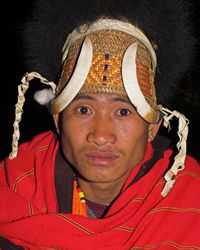Gaqkat in Myanmar (Burma)

Photo Source:
Asia Harvest-Operation Myanmar
|
Send Joshua Project a map of this people group.
|
| People Name: | Gaqkat |
| Country: | Myanmar (Burma) |
| 10/40 Window: | Yes |
| Population: | 500 |
| World Population: | 500 |
| Primary Language: | Language unknown |
| Primary Religion: | Christianity |
| Christian Adherents: | 100.00 % |
| Evangelicals: | 30.00 % |
| Scripture: | Unspecified |
| Ministry Resources: | No |
| Jesus Film: | No |
| Audio Recordings: | No |
| People Cluster: | South Asia Tribal - Naga |
| Affinity Bloc: | South Asian Peoples |
| Progress Level: |
|
Identity
The Gaqkat (pronounced “Gakhat”) are known to other tribes in the area by various names, including Vangkaq, Wakka, and Wanga. They are one of dozens of small tribes in this part of Myanmar that have never been documented as a distinct people group until now. The Gaqhat people also live across the border in the Tirap District of Arunachal Pradesh, but in India they have chosen to be counted as part of the Wancho tribe.
Location: With a population of no more than 500 people, the small Gaqkat tribe lives at the foot of the Pangsau Pass, which acts as the main border crossing between Myanmar's Sagaing Region and the mountainous state of Arunachal Pradesh in northeast India. Pangsau, which means “strangers coming” in the Kachin language, has acted as a choke point for ethnic groups in northwest Myanmar, with dozens of small tribal communities making it as far as the Lake of No Return near the border before deciding it was too arduous or risky to attempt to cross into India. Many migrating groups chose to settle down and establish villages in Lahe Township. Videos on the internet offer a glimpse into the Pangsau area and the boundary between Myanmar and India, which may be the most rudimentary international border crossing in the world.
Language: The Gaqkat possess their own ethno-cultural identity and dialect, which appears to be most closely related to Chuyo, although more research needs to be done to ascertain its relationship to other varieties. Because of the significant differences between many of the languages, Burmese is used as the lingua franca (common speech) in the area.
History
The small Lake of No Return, which is only about a mile long, was so-named because of the large number of airplanes that crashed into it and sunk to the bottom during the Second World War, as allied pilots attempted to fly weapons and supplies from India to China to help the Chinese government repel the advancing Japanese armies. Rather than it being a local version of the Bermuda Triangle, however, it is thought that many pilots crashed into the lake while attempting a “soft landing” on the water after experiencing mechanical problems while trying to cross this southeast spur of the Himalayas.
Customs
The Gaqkat and other tribes love to perform traditional songs and dances, and some families attend the annual Pangsau Pass International Festival on the Indian side of the border. The festival, which started in 2007, attracts people from various tribes, who show off their rich culture and engage in other fun activities. The event also affords an opportunity for people to catch up with relatives from the other side of the border, while young men and women may scope out prospective partners.
Religion
Historically they practiced Animism, which kept them impoverished due to the demands of shamans, who required sacrifices of valuable livestock to placate the evil spirits. Although some tribes in Myanmar have come under Buddhist influence, it is thought that 100 percent of Gaqkat people are Baptist church members today. People movements to Christ, especially in the 1960s and 1970s, swept entire communities into faith in Jesus Christ.
Christianity
Baptist churches dominate the Christian landscape on both sides of the border, but with no Scripture available in a language they can easily understand and very little training being conducted among them, the faith of many Gaqkat believers risks being superficial. By default, most believers use Burmese Bibles, which is not their heart language. The Gaqkat church is in great need of encouragement and foundational Bible teaching.